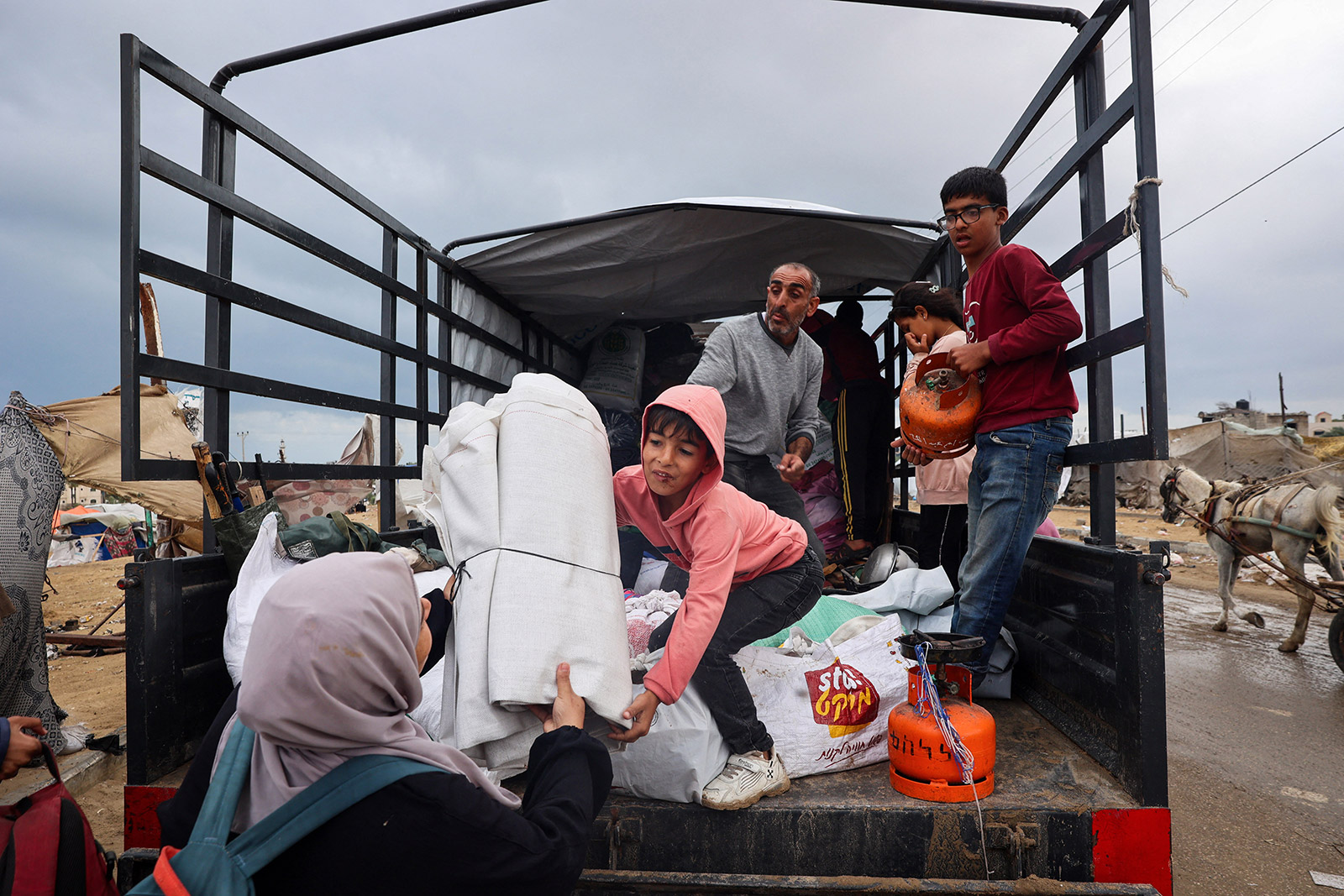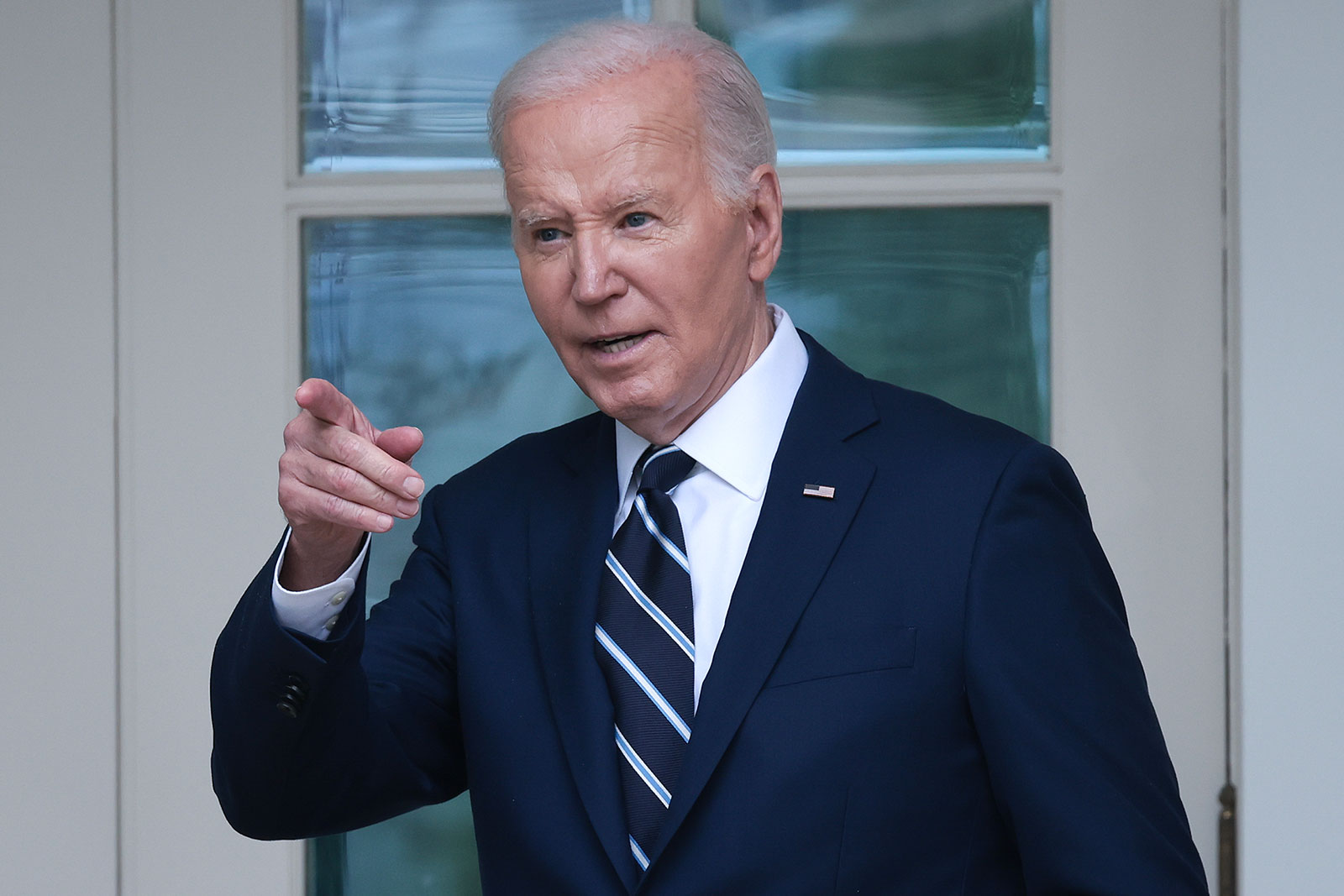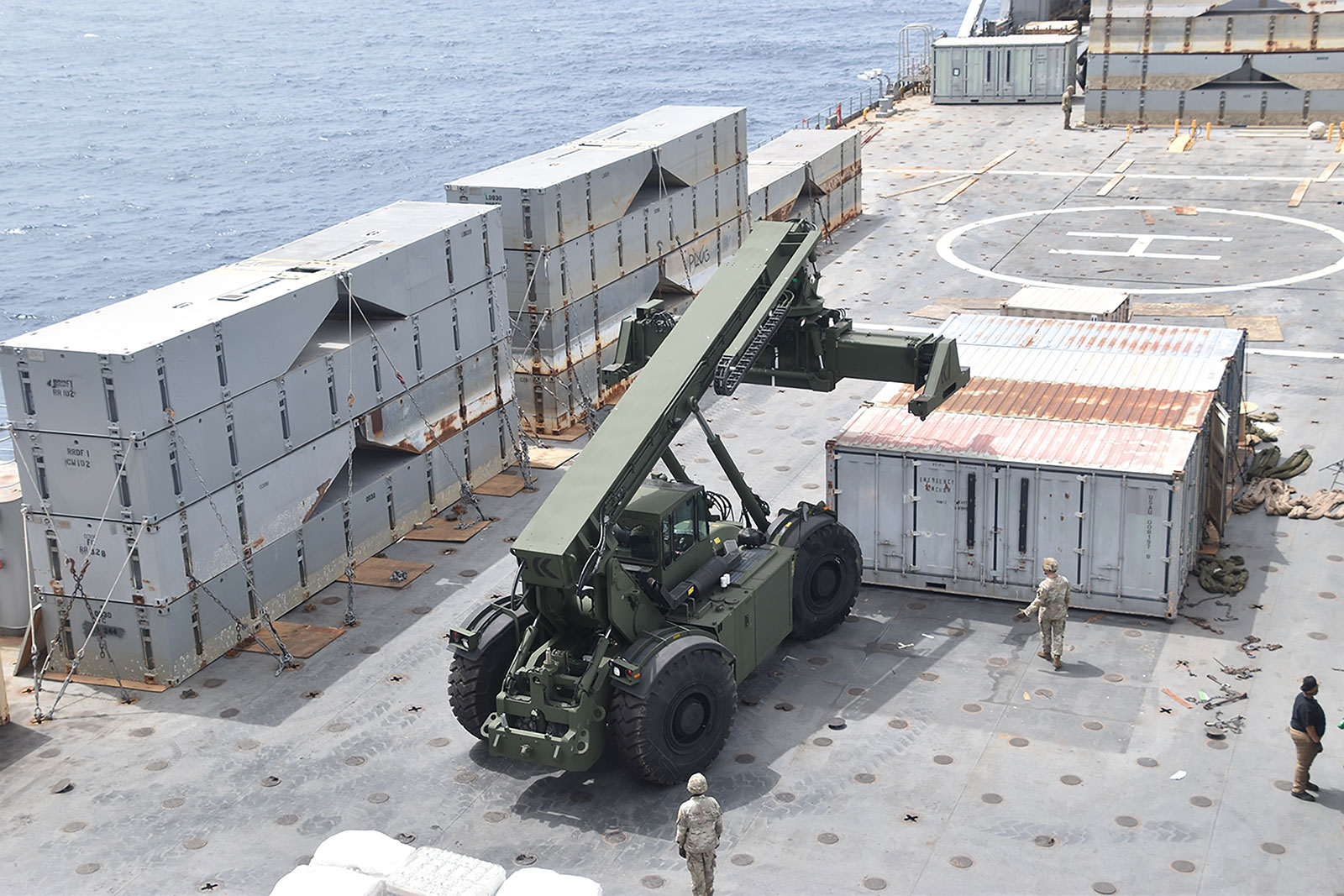Our live coverage for the day has ended. Follow the latest Israel-Hamas war news or read through the updates below.
May 14, 2024 Israel-Hamas war
By Heather Chen, Sana Noor Haq and Aditi Sangal, CNN
450,000 people who fled Rafah lack shelter, water and latrines, UN says
From CNN's Richard Roth and Hande Atay Alam

Almost 450,000 people who have fled Rafah over the last week lack shelter, water and latrines, according to the UN's main relief agency in Gaza (UNRWA).
UNRWA reported Tuesday that families continue to flee Rafah in search of safety, fleeing wherever they can – including to rubble and sand dunes.
The report said families displaced from Rafah are arriving at sites that lack shelter, latrines and water points.
The UN report said all parties must respect international humanitarian law and civilians' essential needs "including food, shelter, water and health – must be met, wherever they are in Gaza and whether they move or stay. "
It is impossible to improve the situation at displacement sites if supplies can't enter Gaza, it said.
The report also said that Israeli settlers attacked aid trucks bound for Gaza in the occupied West Bank on Monday, according to the agency's office for the Coordination of Humanitarian Affairs (OCHA).
"The settlers offloaded and vandalized the vehicles at the Tarqumiya checkpoint and near the Barrier by Beit ‘Awwa. Several trucks were damaged," OCHA said.
The UN called for Israel to do more to protect aid trucks from violence by Israeli settlers and ensure that all allegations of settler violence are investigated and the perpetrators prosecuted.
Biden administration begins lengthy process to approve $1 billion arms deal for Israel
From CNN's Kylie Atwood
The Biden administration on Tuesday began the early stages of a process to move ahead with a new $1 billion arms deal for Israel, according to two congressional sources.
The State Department has now opened discussions with the House Foreign Affairs and Senate Foreign Relations committees about the possible sale. There is no set timeline for when Congress would officially be notified of the sale, setting into motion a clock for its approval.
The potential sale would include the potential transfer of $700 million in tank ammunition, $500 million in tactical vehicles and $60 million in mortar rounds, one of the congressional sources said. The Wall Street Journal was the first to report on the administration’s discussions with Congress about this sale.
The weapons under discussion would not arrive in Israel imminently. The sale would still need to be officially notified to Congress and receive congressional approval, which could take years.
The decision to get the wheels in motion for this new weapons deal comes as the Biden administration has paused the shipment of 2,000-pound bombs and 500-pound bombs to Israel, citing opposition to the weapons being used in the densely populated areas of Rafah.
While US officials have said that other cases of weapons shipments to Israel would be under review, they have also said that the US will continue to make sure that Israel has the military capacity to defend itself, indicating that longer-term weapons deals are not going to be halted at this time.
“We are continuing to send military assistance, and we will ensure that Israel receives the full amount provided in the supplemental. We have paused a shipment of 2,000-pound bombs because we do not believe they should be dropped in densely populated cities. We are talking to the Israeli government about this,” National Security Adviser Jake Sullivan said on Monday.
The State Department did not comment on the informal notification other than to point to Sullivan’s remarks.
The Pentagon also declined to comment.
Biden warns he would veto GOP-led Israel aid bill if it passes
From CNN's Sam Fossum

US President Joe Biden would veto the GOP-led bill that would compel the delivery of defensive weapons to Israel amid blowback on Capitol Hill following Biden’s decision to withhold at least one arms shipment to Israel over concerns about an extensive incursion into Rafah, the White House said Tuesday.
“The bill is a misguided reaction to a deliberate distortion of the Administration’s approach to Israel. The President has been clear: we will always ensure Israel has what it needs to defend itself. Our commitment to Israel is ironclad,” according to a statement released by the Office of Management and Budget.
The bill, which is expected to be voted on Thursday in the House, aims to prohibit the administration from withholding, halting, reversing or canceling the delivery of defense articles or defense services from the United States to Israel, and requires any defense articles or defense services that have already been withheld to be released within 15 days of the bill’s enactment.
“The bill would undermine the President’s ability to execute an effective foreign policy. This bill could raise serious concerns about infringement on the President’s authorities under Article II of the Constitution, including his duties as Commander-in-Chief and Chief Executive and his power to conduct foreign relations,” the statement added.
The bill, as CNN has reported, is unlikely to be taken up in the Democratic-led Senate.
Hostage's parents express frustration at the stalled negotiations between Israel and Hamas
From CNN's Hande Atay Alam and Jonny Hallam

The parents of Hersh Goldberg-Polin, an Israeli-American hostage held in Gaza, have suggested that a hostage family member and a Gazan civilian should be in the negotiation room to help end the deadlock in ceasefire negotiations.
"Something is stuck," Jon Polin told CNN Tuesday. "Here's an idea. We are happy to come sit in that room with you. We are happy to bring in a family of suffering Gazan civilians to also join us in that room."
Polin said while they don't have diplomatic experience and they are not politicians, they have something else that is very valuable: "We are deeply emotionally connected to solving this conflict."
Rachel Goldberg Polin, the hostage's mother, told CNN they feel tremendous frustration every time negotiations stall.
"Those people in that room should actually be locked in that room until they can come up with a solution," she said.
Remember: Goldberg-Polin, then 23, was kidnapped from the Nova music festival during Hamas’ attacks on Israel when more than 1,200 people died and more than 200 people were taken hostage. An end to the war in Gaza appears as far off as ever after the latest round of indirect talks on a ceasefire in Gaza and a hostage release deal ended in deadlock late last week. Qatari and Egyptian mediators have said significant differences remain between Israel and Hamas over halting fighting in the Gaza Strip.
Catch up on the latest from Israel's war in Gaza
From CNN's staff
Aid agencies are warning any escalation in Rafah risks exacerbating the already deteriorating humanitarian situation in the Gaza Strip. Officials from UNICEF, Doctors without Borders and the Palestine Red Crescent Society all voiced concerns that hostilities were increasing at the same time as a squeeze on the entry of aid into the enclave.
Israeli Foreign Minister Israel Katz's call for Egypt to reopen the Rafah border crossing has sparked a heated exchange with his Egyptian counterpart Sameh Shoukry, who characterized Katz's comments as an attempt to shift blame for the Gaza humanitarian crisis onto Egypt.
Here's what else to know:
- Aid into Gaza: Only 50 humanitarian aid trucks made it through to Gaza on Sunday, down from hundreds per day in previous weeks, a State Department spokesperson said, adding that the number that is “not nearly enough.” The US announced that the World Food Programme will be the organization that will receive and distribute aid to Gaza from the American-built temporary floating pier.
- Far-right protests in Israel: Tens of thousands of far-right protesters in the southern Israeli city of Sderot called for the construction of settlements in the Gaza Strip on Tuesday, as right-wing rhetoric over Israel's military campaign in the enclave gains momentum. People marched in a “returning home” demonstration for “extensive settlement in the Gaza Strip to guarantee the achievements of the war.” Israeli settlement in the Gaza Strip would “correct the past mistakes of Oslo and the ‘disengagement,'" organizers said. CNN could not confirm the number of attendees and Israeli police does not provide attendance figures for rallies.
- IDF says it struck UN school in Gaza: The Israel Defense Forces (IDF) said it struck a “Hamas war room” embedded inside a school operated by the United Nations' agency for Palestinian refugees, UNRWA, in the Nuseirat refugee camp in central Gaza on Tuesday. CNN cannot independently confirm the IDF claim. A UNRWA official said the agency is not able to confirm the claims from the Israeli military. Al Awda hospital in Gaza said it had received 11 bodies from this strike.
- UN investigation into killed and injured staffers: The UN assembled a fact-finding panel to investigate an attack earlier this week that killed one staff member and injured another in Rafah, in southern Gaza. A vehicle branded with UN insignia was targeted on Monday, prompting swift condemnation from international leaders.
A deadly heat wave fueled by climate change worsened Gaza’s humanitarian crisis, new data shows
From CNN's Laura Paddison
A deadly heat wave in Gaza in April, which saw punishing temperatures worsen an already dire humanitarian crisis, was made hotter and more likely by the human-caused climate crisis, according to an analysis published Tuesday.
Gaza was not alone. Several heat waves spanning a vast area of the Asian continent last month during the world’s hottest April on record were made more intense and likely by the climate crisis, the analysis from the World Weather Attribution initiative (WWA) found.
The WWA report divided the heat waves into three areas: West Asia, the Philippines and a region spanning South and Southeast Asia.
In West Asia, the analysis focused on the Palestinian territories, Syria, Lebanon, Israel and Jordan, where temperatures spiked above 40 degrees Celsius (104 Fahrenheit) last month. It found climate change made the heat in this region around five times more likely and 1.7 degrees Celsius hotter than it would have been before humans started burning large amounts of fossil fuels.
Soaring temperatures had a particularly stark impact on the 1.7 million displaced people in Gaza, already struggling with insufficient water access and inadequate healthcare. There was little respite from the relentless heat for those crammed into makeshift tents and shelters, often covered with plastic sheets. At least three people, including two children, reportedly died from the heat, the analysis notes.
“From Gaza to Delhi to Manila, people suffered and died when April temperatures soared in Asia,” Friederike Otto, senior lecturer in climate science at the Grantham Institute for Climate Change and the Environment and a report author, said in a statement. “Heat waves have always happened. But the additional heat, driven by emissions from oil, gas and coal, is resulting in death for many people.”
Read more about climate's effect on humanitarian conditions.
Young Gazans with amputated and injured legs find care in the US, but face an uncertain future
From CNN's Aditi Sangal

Ahed Bseso lay on the kitchen table in her home in Gaza, watching as her uncle amputated her wounded right leg. Standing by, her mother cried, “Ahed is dead!”
But 18-year-old Bseso was very much alive, and she survived to tell her story from a hospital in Greenville, South Carolina.
Bseso said that on December 19, she went to the top floor of her house in Gaza to get a phone signal when an Israeli tank outside fired at her building. It destroyed part of her home’s wall, which came crashing down on her leg, along with heavy debris. With her neighborhood under siege and no possibility of medical attention, her uncle, who used to work as an orthopedic surgeon, used kitchen supplies to amputate her leg below the knee and dress it with unsterilized gauze.
“For four days, I couldn’t leave the house because the Israelis wouldn’t let me,” she told CNN through a translator, at the Shriners Children’s hospital. “There was no medication I could take to inhibit the pain or to help me with my condition. So, I just sat in agony for four days.”
A video of her amputation went viral and caught the attention of the Palestine Children’s Relief Fund (PCRF), a US organization that provides free health care to thousands of injured and ill Palestinian children in the Middle East. The organization worked for weeks to bring her to the US for medical care, according to Tareq Hailat, head of the Treatment Abroad program at PCRF.
She is one of three Palestinians who received PCRF’s help to come to the US for leg injury treatment.
At least 1,000 children in Gaza have had one or both legs amputated, UNICEF reported in December. Though he couldn’t give an exact figure, UNICEF spokesperson Joe English told CNN that the number has since grown.
World Food Programme will distribute Gaza aid from temporary pier, Pentagon says
From CNN's Michael Conte and Oren Liebermann

The US Defense Department has announced that the World Food Programme will be the organization that will receive and distribute aid to Gaza from the American-built temporary floating pier.
“The US government and other international donors are providing aid commodities for delivery from Cyprus to the beach in Gaza by way of US and partner nation military and civilian vessels, and a temporary floating pier,” Pentagon Press Secretary Maj. Gen. Patrick Ryder told a briefing.
“The World Food Programme will take receipt of that aid once ashore in Gaza and coordinate its onward movement and distribution to people in need.”
Ryder did not say when exactly the pier would be ready to receive aid beyond “the coming days.”
“I'm not going to get into specific dates, but in the coming days you can expect to see this effort underway,” said Ryder.
He also called on “all parties” not to interfere with the distribution of aid.



